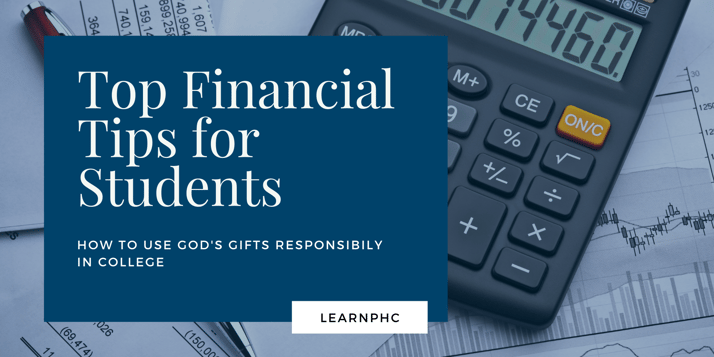
It is really easy to find ways to let money slip away. It is easy to take a look at your paycheck and associate that with spending money. A couple bucks here for that specialty Pop-Tarts flavor and another couple bucks there to go to Washington, D.C. with your floor mates. That's when life gets expensive. Suddenly, you have to go to urgent care, your car breaks, or because of any number of unforeseen realities, you're short on money. You don't want to be in that position.
Several PHC administrators and a PHC student offer advice on how to avoid being in a situation where you cannot afford your expenses. Here's a few tips:
1. Always Be in a Saving Mode
Getting into the habit of saving is an important life skill. Students should be setting aside a portion of their paycheck every month for emergencies. Unexpected expenses can add up over a semester, especially if you own a car. PHC upperclassman Mary Muncy suggests adding to your emergency fund every month until you reach your pre-determined goal. The Vice President of Advancement, Tom Ziemnick, suggests to make your emergency fund big enough to last 3-6 months.

One of the best ways to save money is to have your employers directly deposit a portion of your paycheck into your savings account. Depositing money into your savings account on auto-pilot is a really helpful way to save money. Saving happens in the background so you are less tempted to spend as much.
Be aware of pending charges in your checking account, warns Janet Low, the former Director of Human Resources and Payroll. Do not assume that the balance shown in the overview tab of your bank account is what you have. Also, as alluded to above, she agrees that the biggest threat to saving is spontaneous spending.
2. Make a Budget
Meeting your monthly expenses can be tricky when you are unsure of how much you earn on a monthly basis and how much your expenses are. Making a budget can help you to visualize exactly where your money goes and what actions you need to take.
In order to make a budget, you need to track your expenses. Tracking your expenses helps you recognize bad spending habits such as spending more than you can afford. There are hundreds of financial tracking apps available for your phone if you want to use an app. Muncy recommends is Dave Ramsey's Every Dollar. The more traditional route of tracking your expenses is by making a spreadsheet. Both Google Sheets and Microsoft Excel offer templates to streamline the process.
The goal of budgeting is to ensure that you are not spending more than you make. If you consistently spend more than you make, then that should be a sign that you need to alter your spending habits or adjust your work commitments.
When you're making a budget, it is important to remember the hidden expenses. For example, if you own a car, your budget should include car insurance, gas, and anything a cushion for unforeseen repairs. When people come to college, they often plan for tuition, dining, housing, and books but forget about printing, laundry, parking, and the occasional trip to Chick-fil-A.
Remember that your financial situation can change in the future. Job security can change if the economy does. As a result, have a back up plan to get yourself back on track if something unexpected happens.

3. Remember to Tithe
Each man should give what he has decided in his heart to give, not reluctantly or under compulsion, for God loves a cheerful giver.
2 Corinthians 9:7
Traditionally, Christians give 10% of their income (The word "tithe" is Old English for "tenth"). And back to Dave Ramsey for a bit of context. It is important to remember that everything belongs to God and everything is for His glory. With money, it is easy to forget that it belongs to God. The paradigm in play here is answering the question: "Who sustains me?" Giving to the Lord is a reflection of the heart of the giver and a recognition that we are not dependent on ourselves or anyone else for our needs. All that we have comes from the benevolence of God.
Ziemnick advises to pray through your money. The Lord may call you to give more than you think you can give. If He does, it is important to remember that God is a provider and we should not worry about financial shortcomings. It is important to make a plan, but God has the master plan.

4. Use Your Credit Card Sparingly
Using a credit card responsibly is one of the most beneficial life lessons that students can learn. A good credit score will save you thousands of dollars when making major purchases in the future, but credit card spending can spiral out of control easily. A few bruising hits to your credit score will take years to heal.
One of the most important principles when using a credit card is to pay off your expenses at the end of the month. If they are not paid off by the end of the month, then interest accumulates, and now you're paying more for everything you charged.
Because heavy credit cards debt is like carrying a gorilla on your back, it is important to be aware of the expenses you charge. Students ought to use credit cards mostly for small purchases. It can also be a great savior for emergencies, like going to urgent care, if no other option is available.
The college years are full of learning opportunities; most of which happen outside of the academic arena. Financial planning and stewardship is one of those important courses to ace. Want some additional coaching? Ask your loved ones or someone in leadership. They've been there too!
______
Do you know a Christian who is college-bound? Want to learn more about preparing for enrollment into a selective college? Click the button for our free guide—the High School Resource Guide!




